Features of floor tiling
Several key nuances:
- Depending on the shape of the floor tile products, there are several layout options that allow you not only to achieve an unusual design, but also to visually adjust the dimensions of the space, for example, herringbone, diagonal, offset, and others.
- When choosing a grout for the seams, take into account the shade of the tile product, but a contrasting solution also looks no less original. For example, a finish with imitation wood is better combined with a tone-on-tone grout, thus achieving the illusion of a single seamless surface. If the finish is decorated with bright patterns, they will look even more colorful in combination with beige or milky grout.
- From a practical point of view, it is advisable to choose models in not too light shades or a covering with interesting patterns for the floor, since dust and dirt will be less visible on this surface.
- To visually expand a small room, you should choose light cladding, which adds light and space to the room.
Types of tiles
Depending on the composition and external design, this finish is divided into the following varieties:
- Ceramic. It has the widest range of applications, has an extraordinary variety of models, colors and patterns. Tiles are made by obtaining a base, painting and firing. The disadvantage of these models is fragility.
- Porcelain stoneware. It is a very durable and reliable product, which contains clay, quartz and feldspar. Porcelain stoneware is distinguished by its luxurious and sophisticated appearance and a fairly high price.
- Quartz-vinyl. It is a new and modern type, which has several layers in its structure. It is made of quartz sand and fiberglass, has high-quality soundproofing and fireproof properties.
Currently, there is a large variety of tile finishes, which differ in different designs, textures, colors, technological features and production methods.
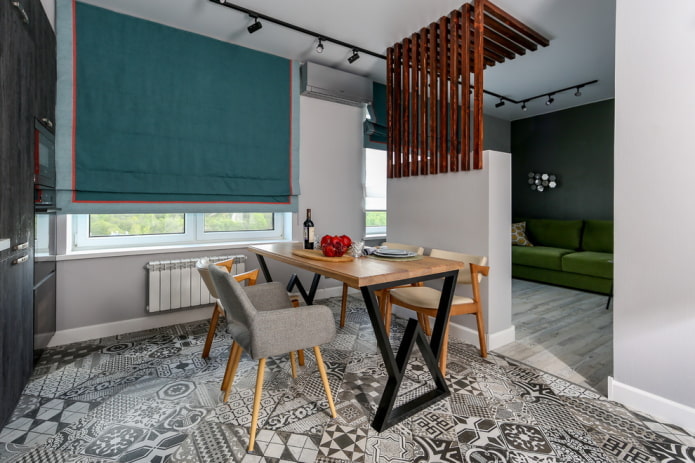
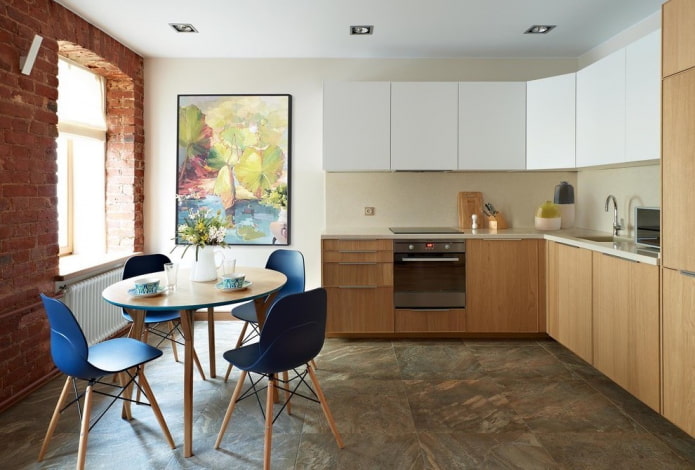
Sizes and shapes of floor tiles
The most popular shapes are square and rectangular. Octagonal models or hexagonal products resembling honeycombs have a more refined and interesting look.
If the floor has small irregularities and imperfections, a fine mosaic will be an excellent solution, which not only creates a very bright and unusual design, but also does not crack from differences in the floor surface.
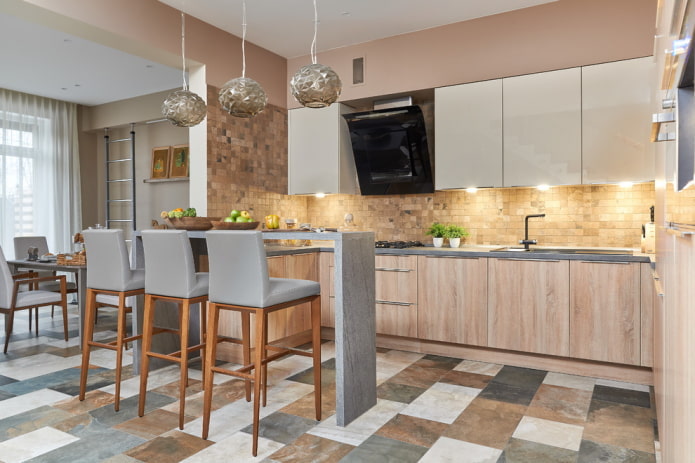
The photo shows a kitchen interior with multi-colored rectangular floor tile cladding.
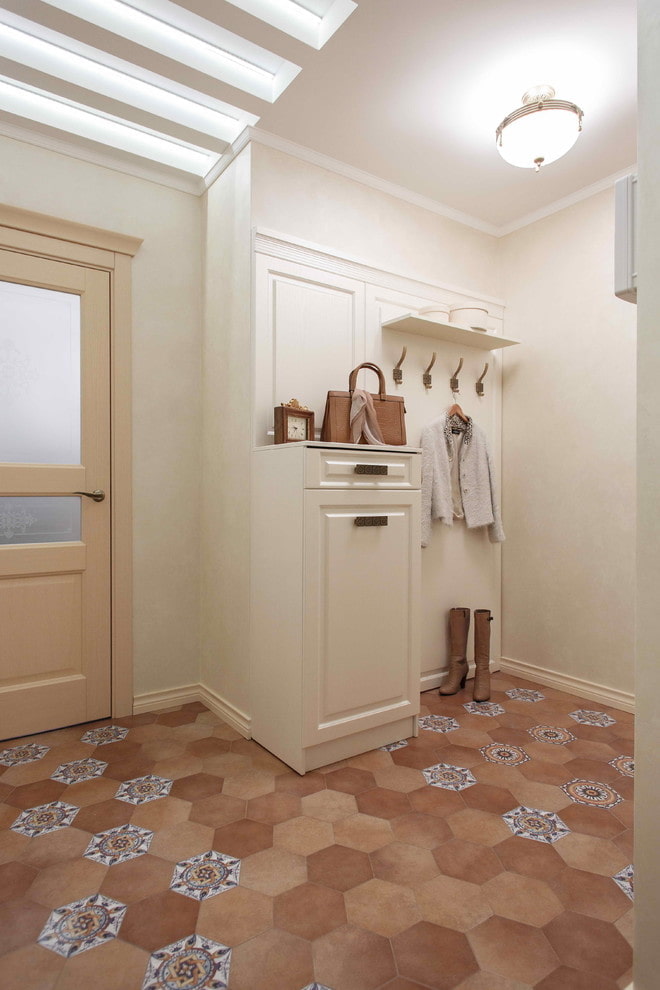
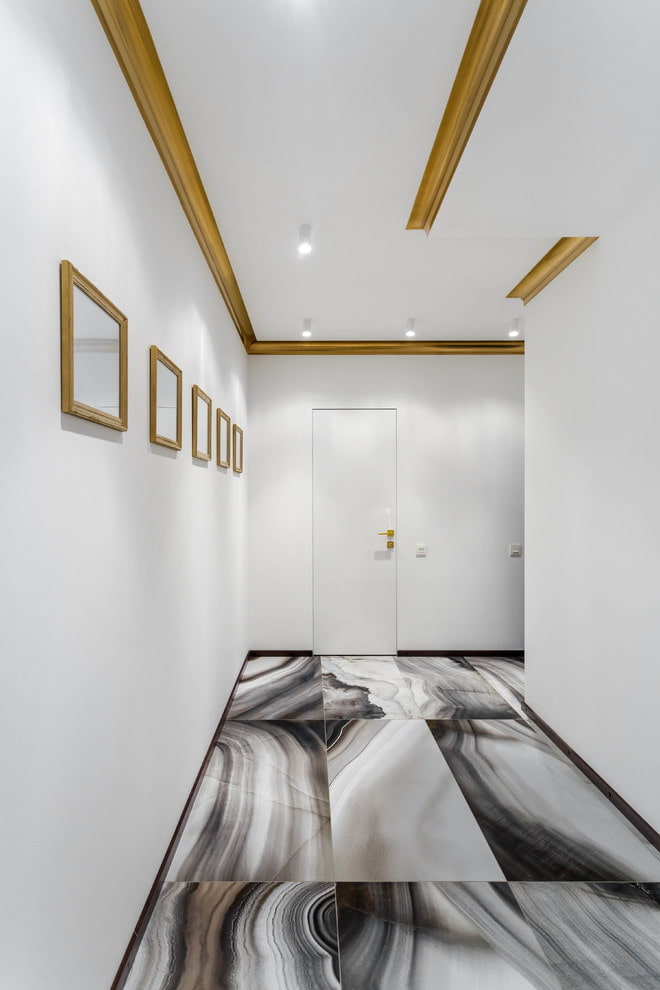
Using complex shapes such as triangles, hexagons, octagons or even rounded edge tiles, you can achieve a unique and perfect floor covering.
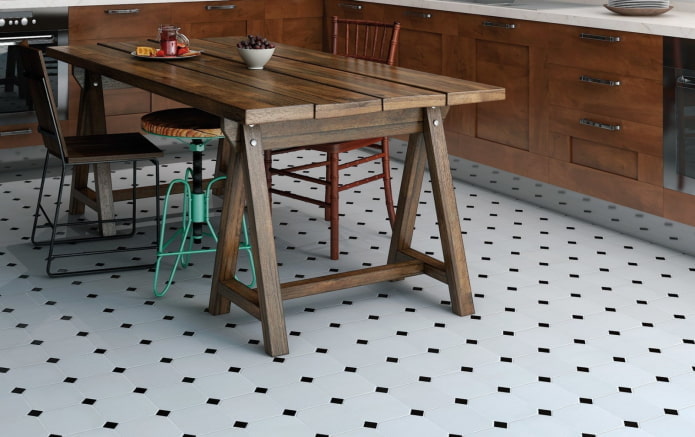
The photo shows white octagonal floor tiles in the kitchen interior.
Floor tile colors
The most popular color scheme.
White
Makes the room much lighter, more comfortable, brings air and freshness into it. White tiles are perfect for decorating a room of any size and purpose.
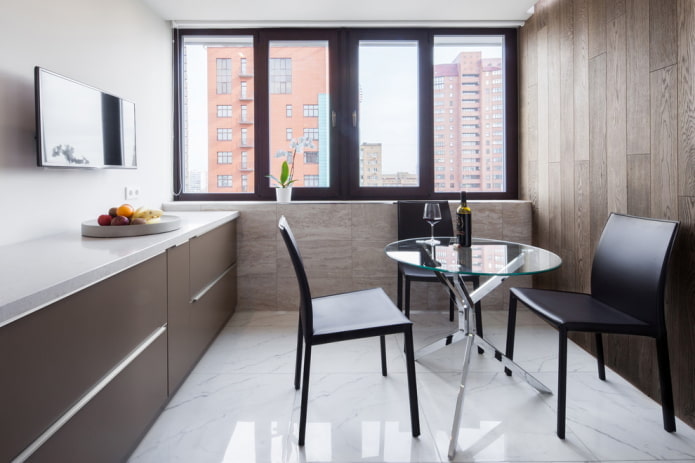
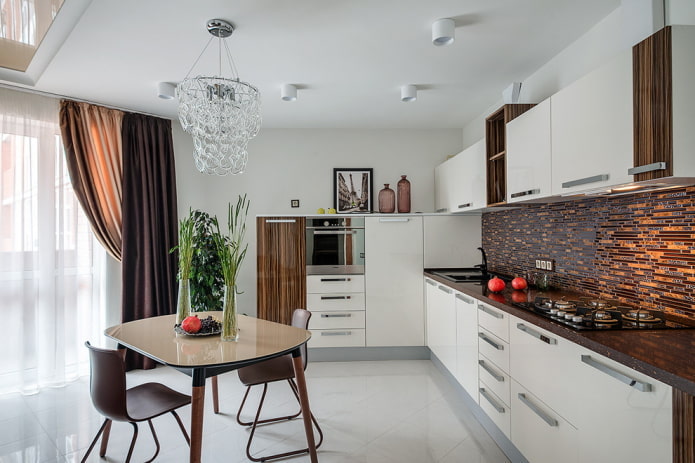
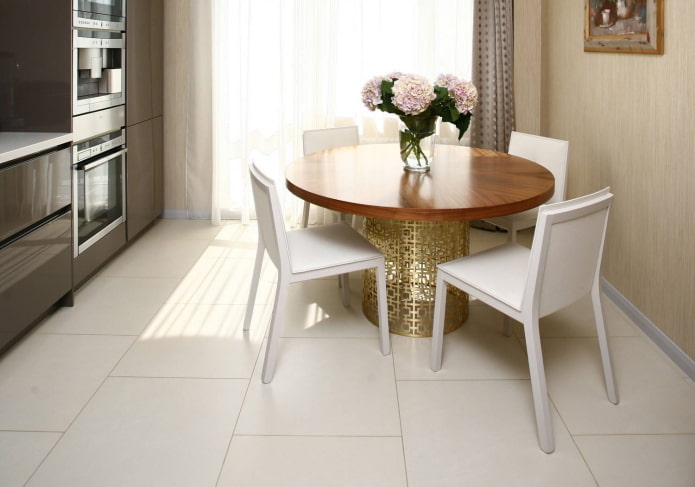
The photo shows a kitchen interior with rectangular floor tiles made in white.
Black and white
This color combination is universal and always has a very stylish and presentable look.
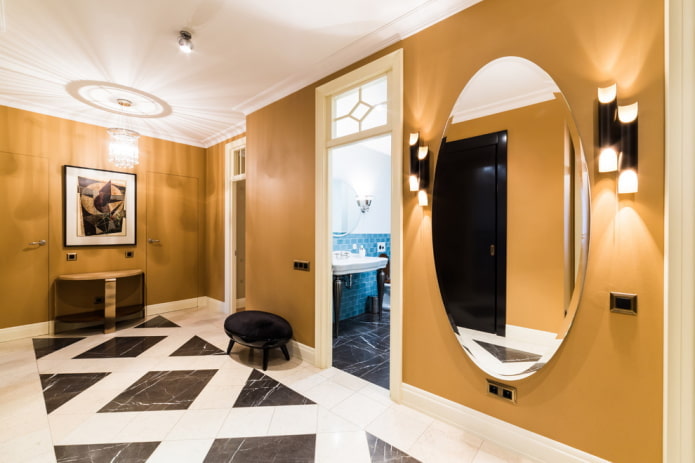
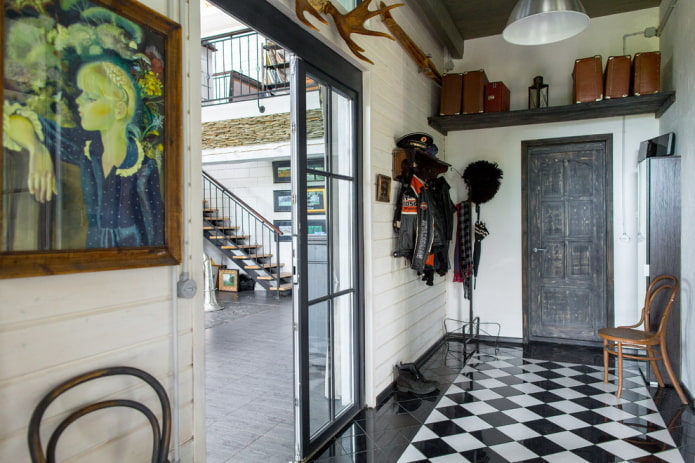
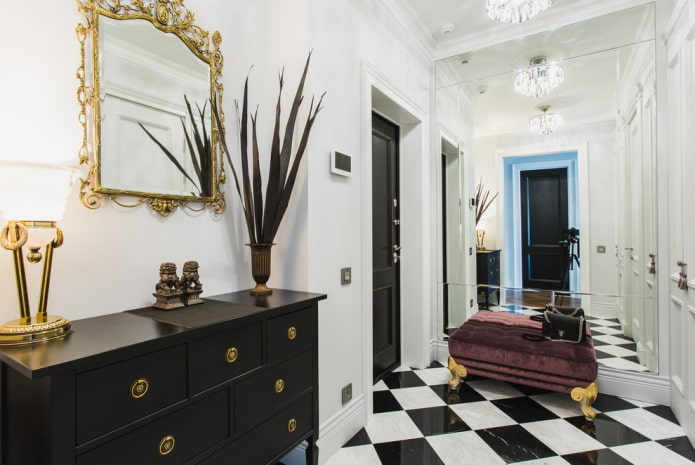
The photo shows black and white floor tiles in the hallway interior.
Black
It looks truly luxurious, gives the interior a special effect and expensiveness, while creating a rather strict and classic interior.
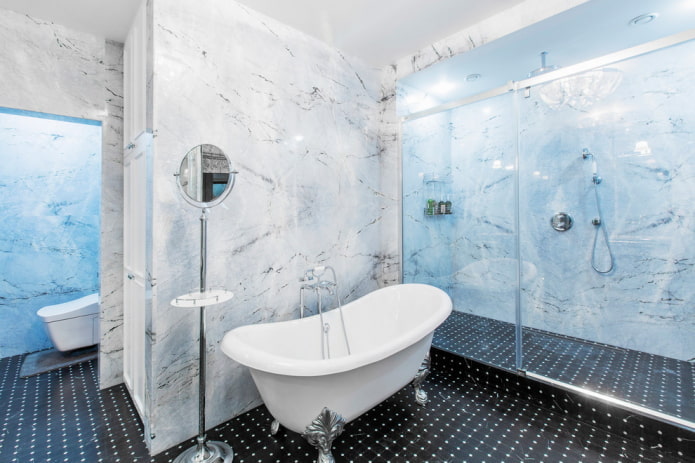
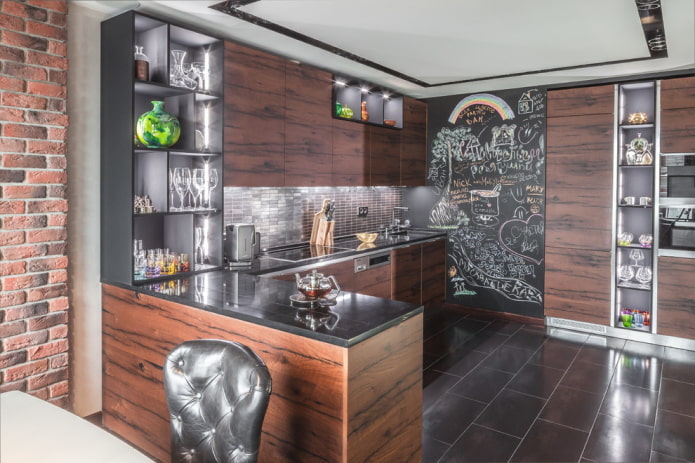
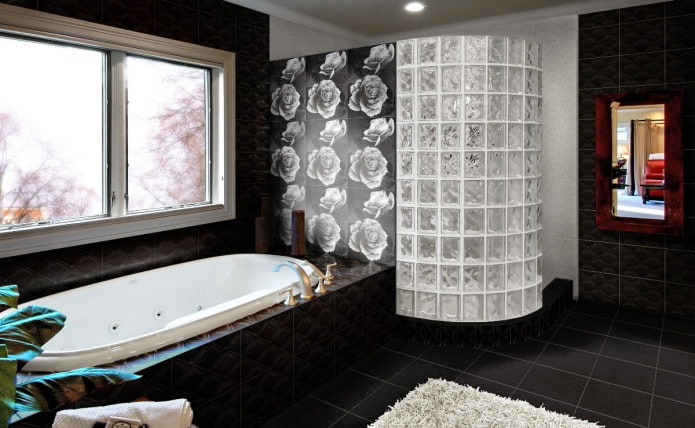
The photo shows a bathroom interior with black square floor tiles.
Gray
Calm and neutral gray finish can be harmoniously combined with almost any colors and, depending on the shade, muffle or, conversely, highlight them favorably.
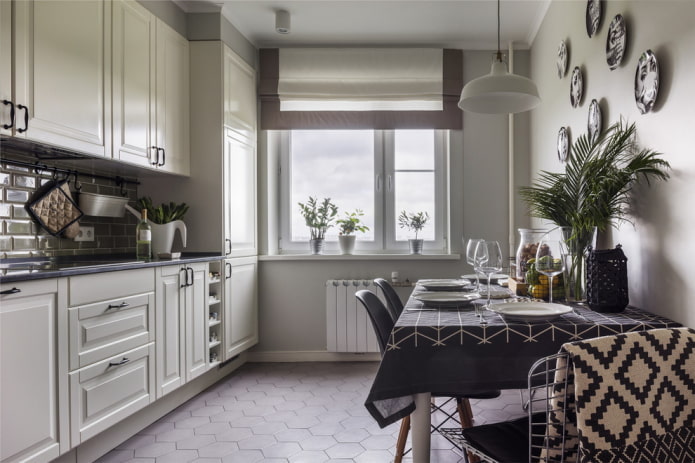
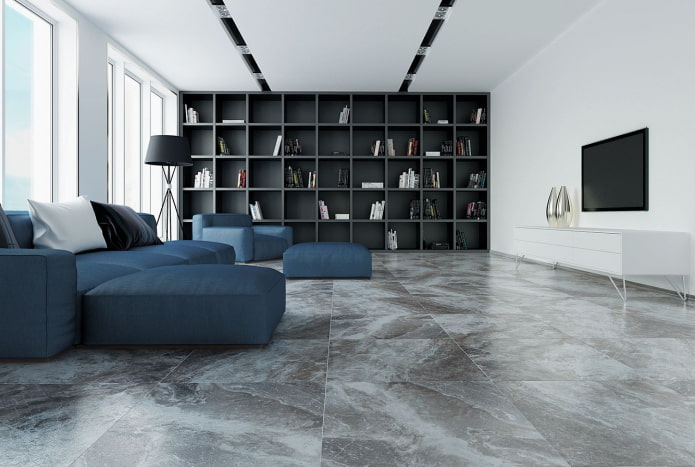
Blue
Blue or blue finish has a very attractive appearance, gives the space sophistication, style and adds a certain mystery to the atmosphere.
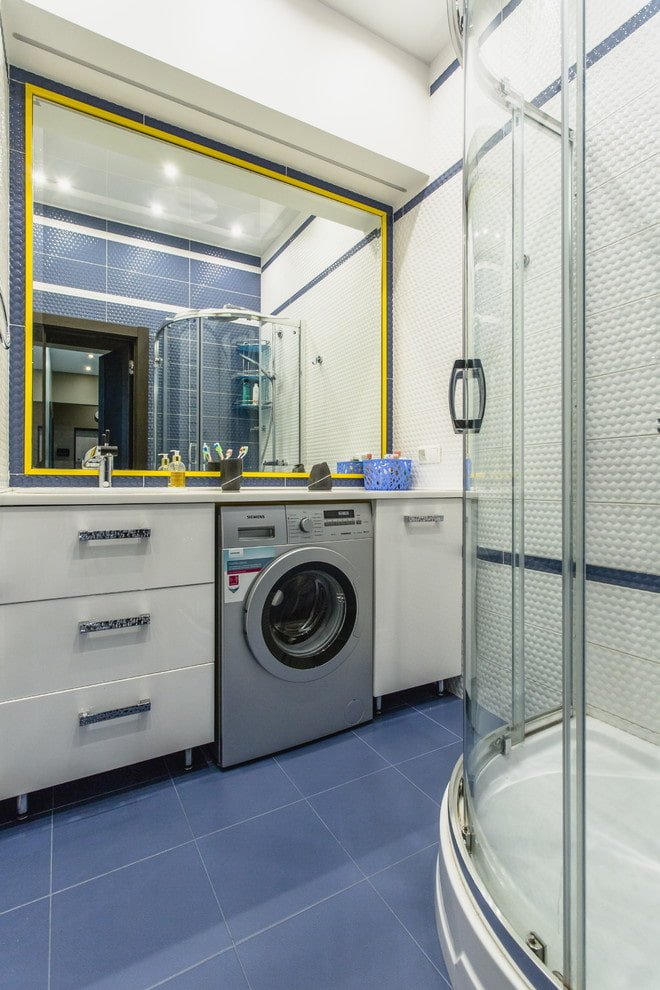
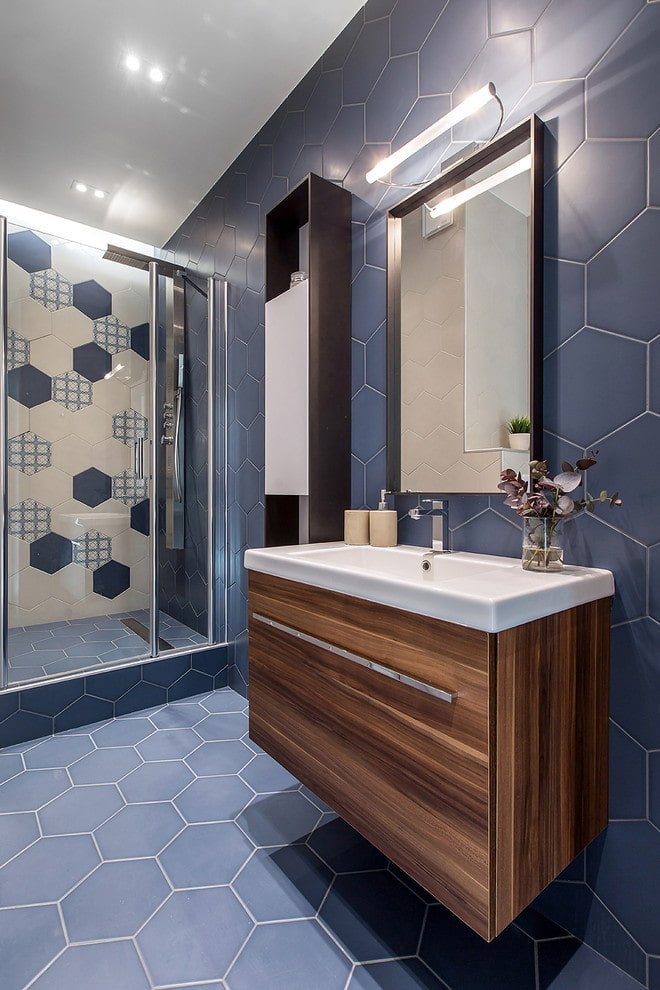
Beige
The cladding in subdued warm beige shades harmonizes perfectly with any design and provides the opportunity to give the atmosphere the necessary coziness.
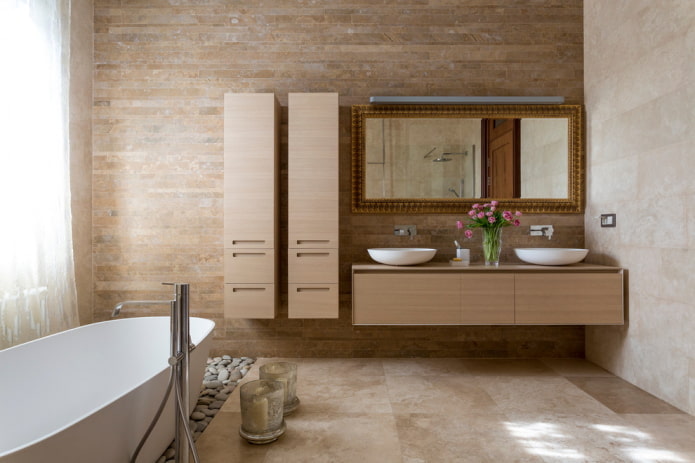
The photo shows a bathroom decorated with beige floor tiles.
Green
Can have a wide variety of shades, such as light green, lime, olive, light green, deep malachite or emerald. This color scheme significantly refreshes the interior space and fills it with gentle coolness.
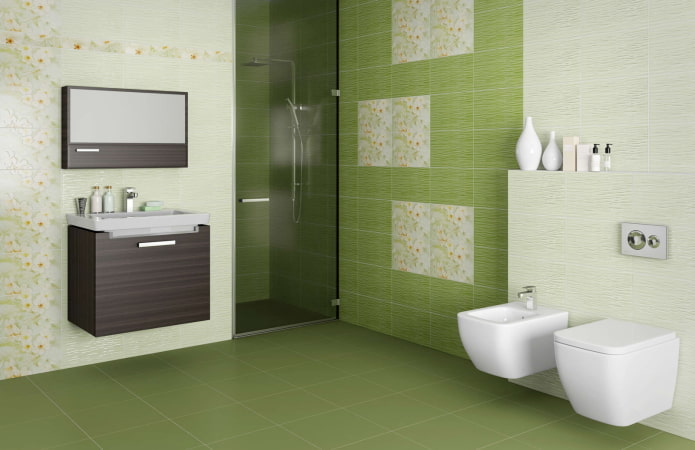
Photos of tiles in the interior of rooms
Examples of the use of tile finishing in the design of premises.
In the kitchen
Floor tiles easily fit into the interior and perfectly match the ceiling decoration and kitchen furniture. The main thing is that the style solution is uniform and harmonious.
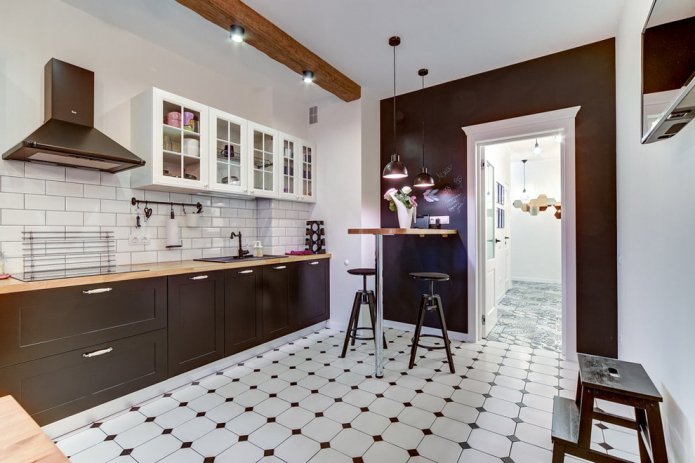
In the bathroom
The floor in the bathroom requires a special material for its design, since the humidity in this room is high and sharp temperature changes occur regularly. Floor tiles are considered one of the most optimal flooring options.
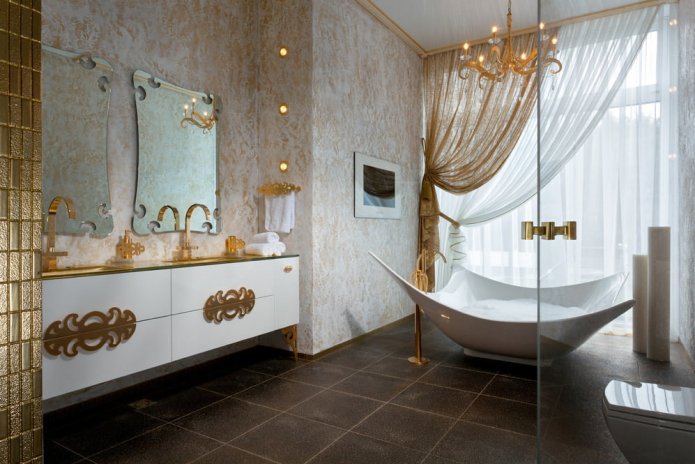
In the hallway or corridor
This facing allows you to achieve a rational, thoughtful and creative design of the corridor. The tile will not only please with its aesthetic appearance, but will also serve for a long time.
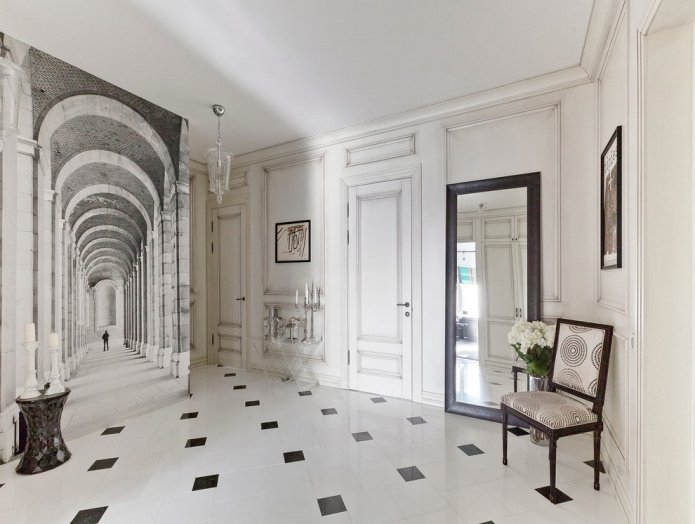
In the living room
To create a more luxurious and respectable design of the living room, use a marble floor finish or no less spectacular cladding with imitation of laminate or parquet, outwardly indistinguishable from the analogue.
An original solution can be achieved by combining products of light and dark shades, in a checkerboard pattern. In the design of the hall, both matte and glossy polished floor tiles will be appropriate, which undoubtedly become an independent decorative element.
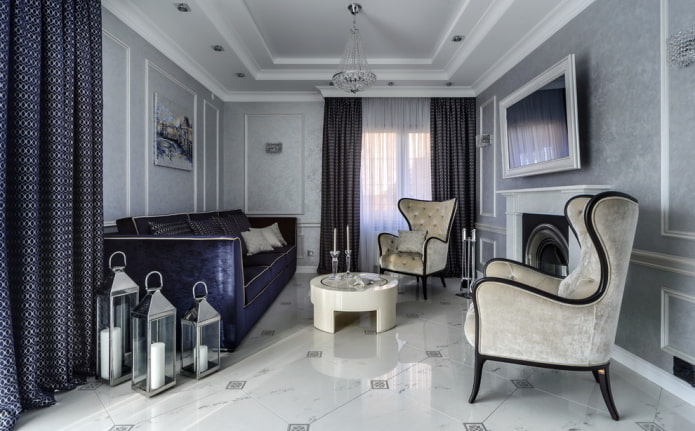
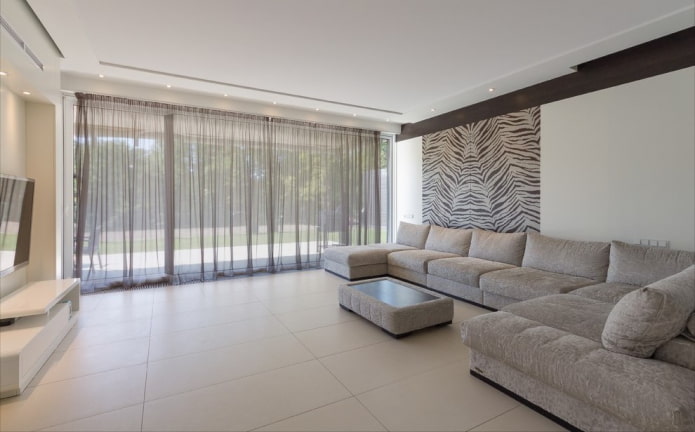
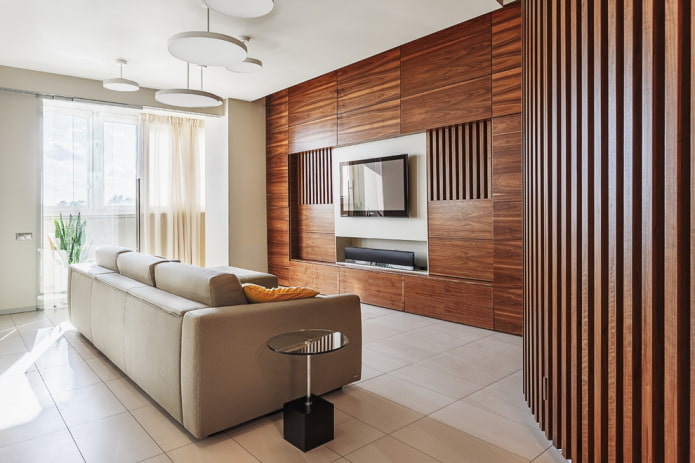
The photo shows the interior of a modern living room with light-colored rectangular floor tiles.
On the balcony
You can use high-quality ceramics in the design of a balcony or loggia, as it has certain technical characteristics that allow it to be used even outdoors. In this way, it is possible to achieve not only a practical covering, but also to implement very extraordinary design ideas.
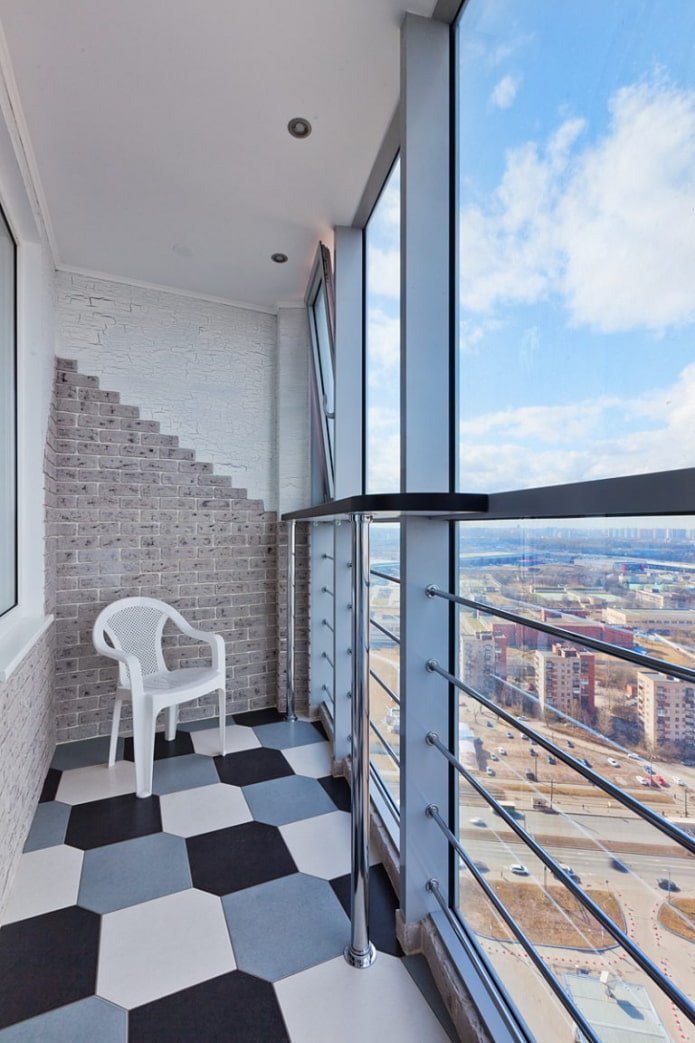
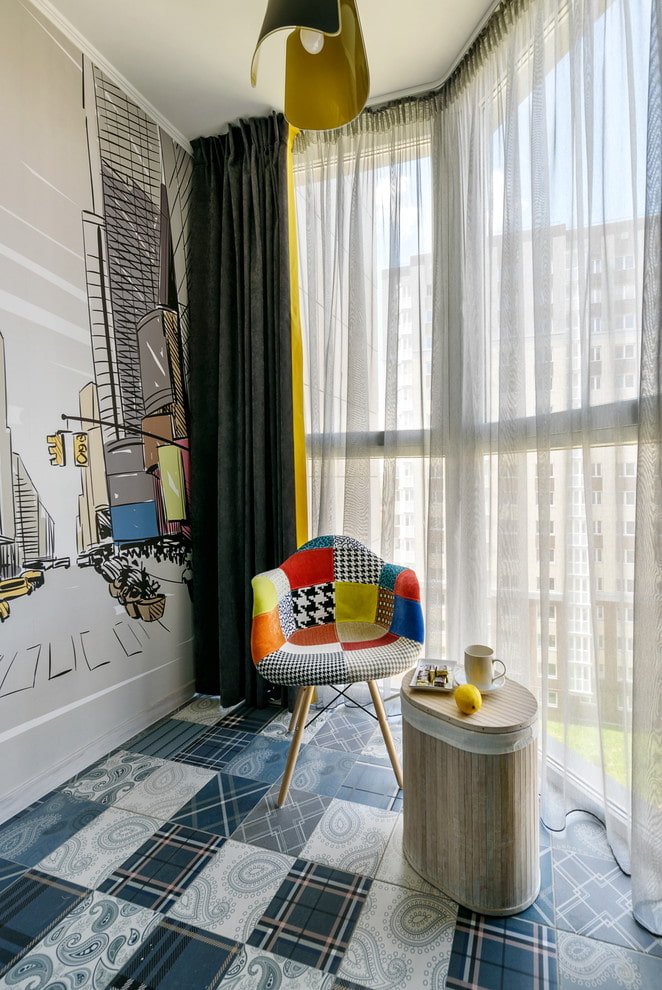
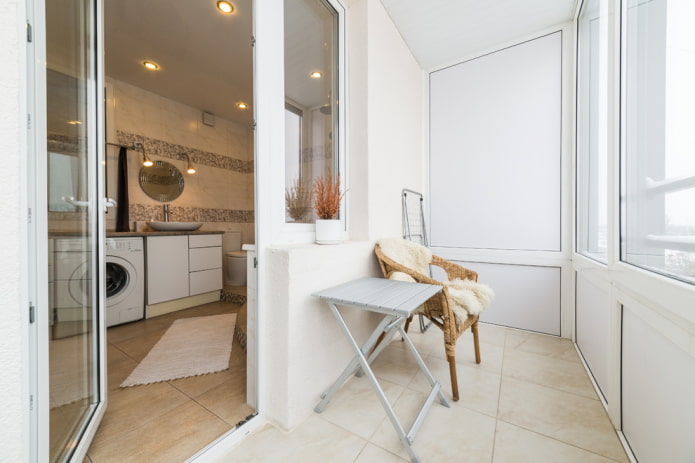
The photo shows a balcony with light beige floor tiles.
In the bedroom
Here it is better to choose tile products that are pleasant to the touch and have a velvety rough texture. It will also be appropriate to use a heated floor or carpets, this will deprive the room of some coldness.
In the bedroom, the floor is laid out with both plain cladding and models that imitate stone, solid wood, parquet, laminate, fabric or leather texture.
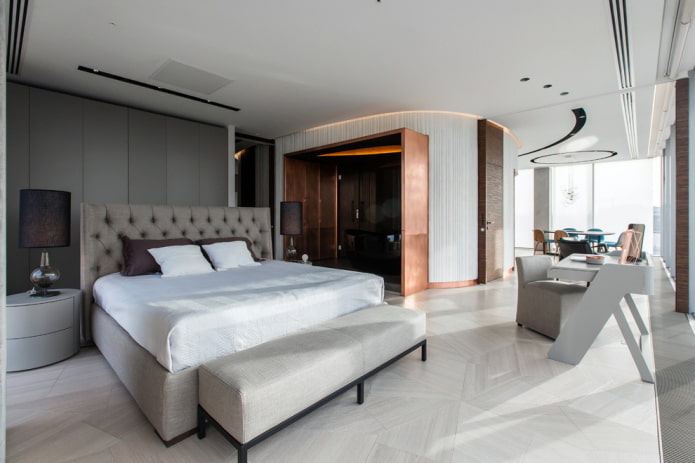
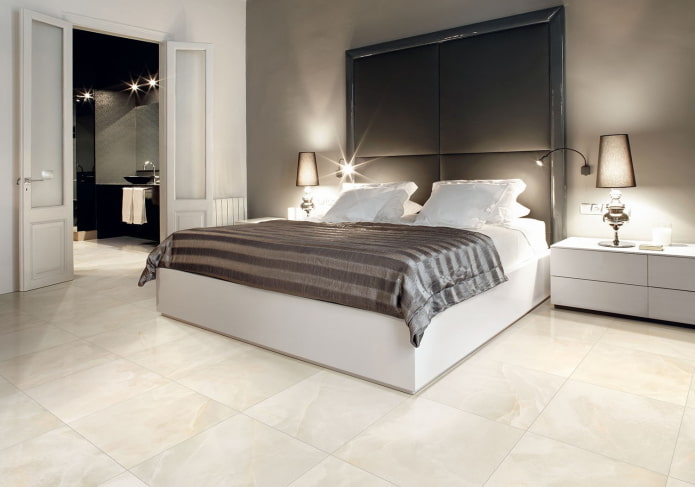
Design and patterns on tiles
Options for designer decoration of tile finishes.
Patchwork tiles
Allows you to create excellent accent compositions in the room, thereby adding notes of provincial charm to it.
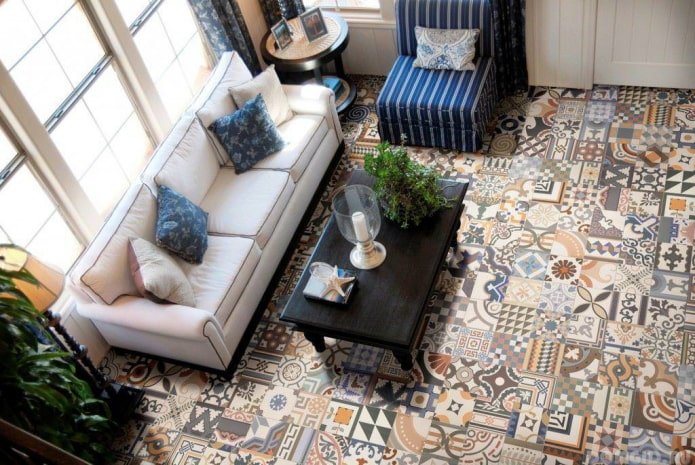
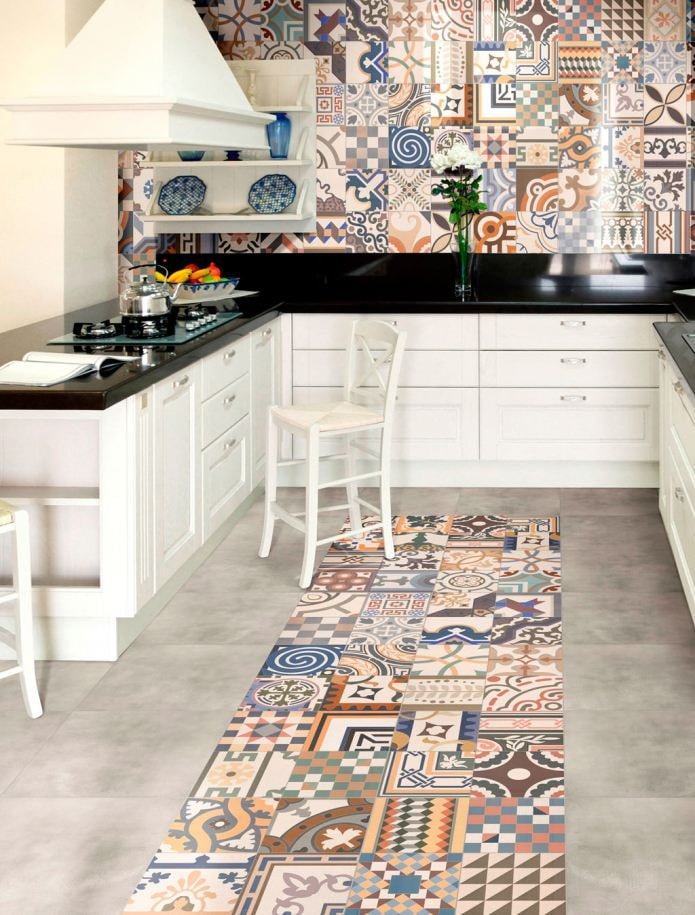
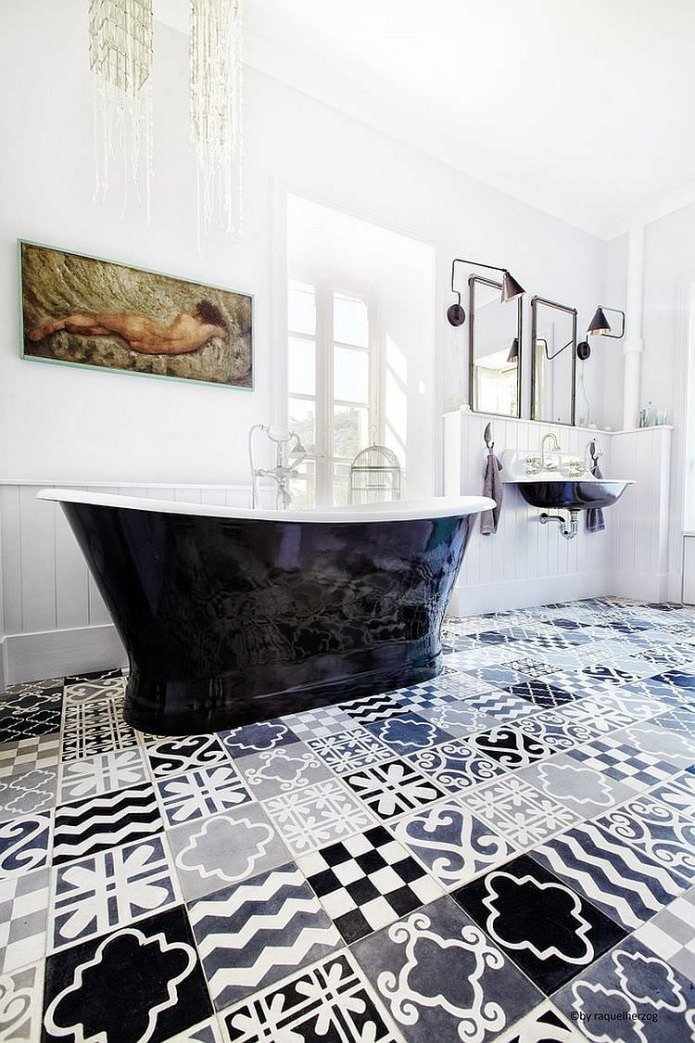
Marble tiles
Due to natural streaks and natural texture, this finish is almost indistinguishable from real marble. Modern models can accurately imitate the color and shade of natural stone, giving the atmosphere a special luxury.
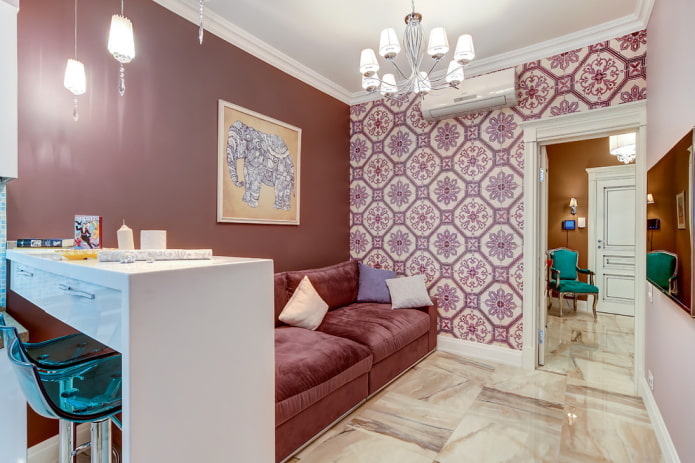
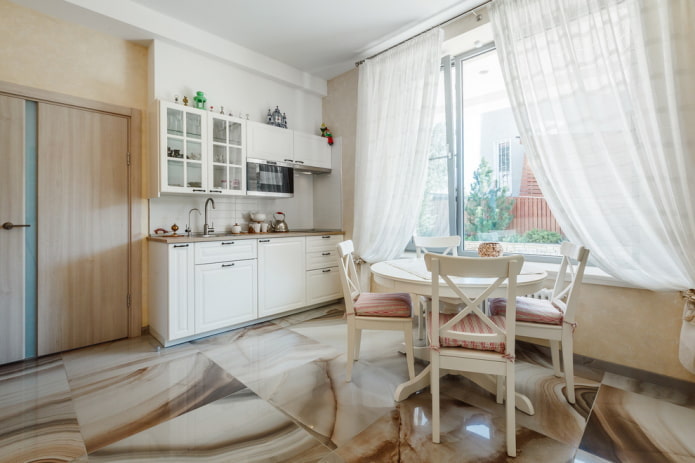
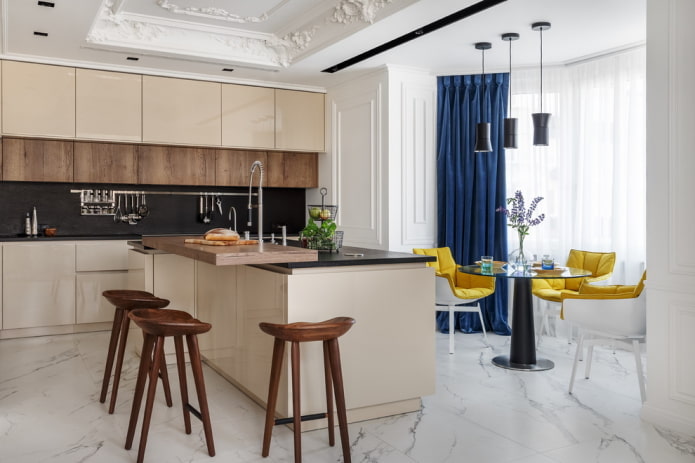
The photo shows floor tile cladding with imitation white marble in the kitchen interior.
Wood
Unlike wood, these tile products are not afraid of high humidity, mechanical and organic impacts, which makes them indispensable in the design of any premises, for example, in country, rustic, Provence or eco-design styles.
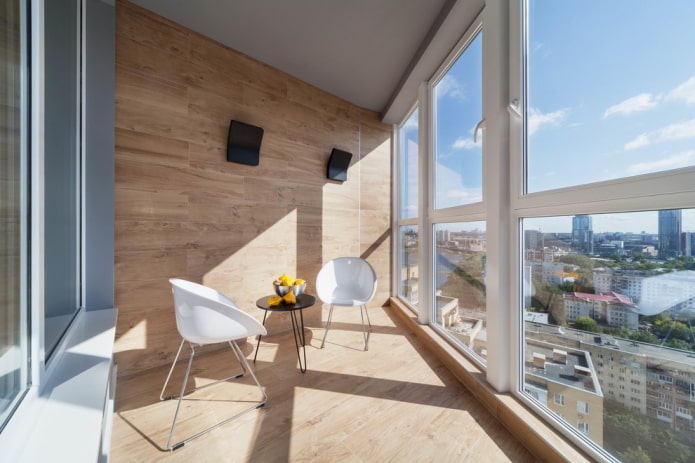
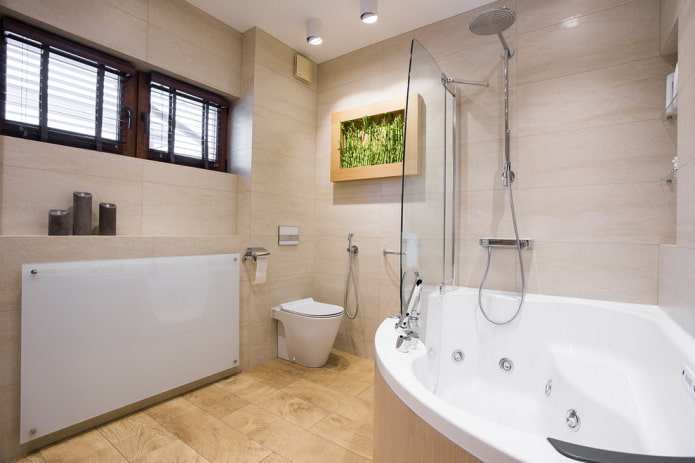
Stone
Thanks to the unique pattern, the floor tile can imitate malachite, basalt or even the most common stones, such as sea or river pebbles.
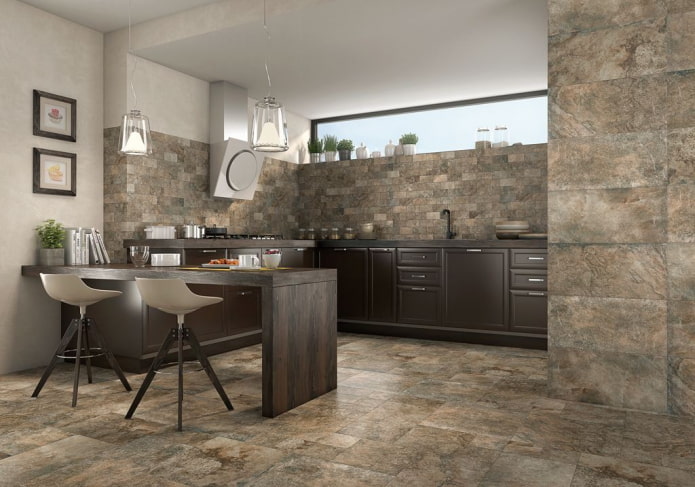
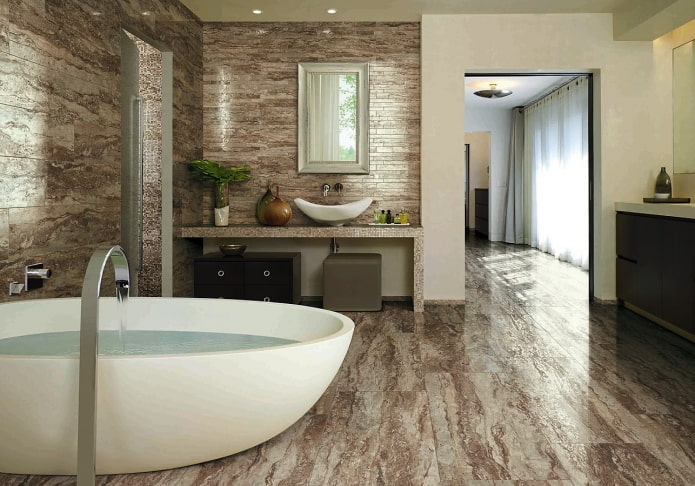
Under metal
Facing imitating various metals, such as copper, brass, silver or gold, is practically no different from the original. The design of this cladding can be somewhat outrageous and have very original textures.
Metalized products are used in a wide variety of interior styles, such as retro, vintage, baroque or hi-tech.
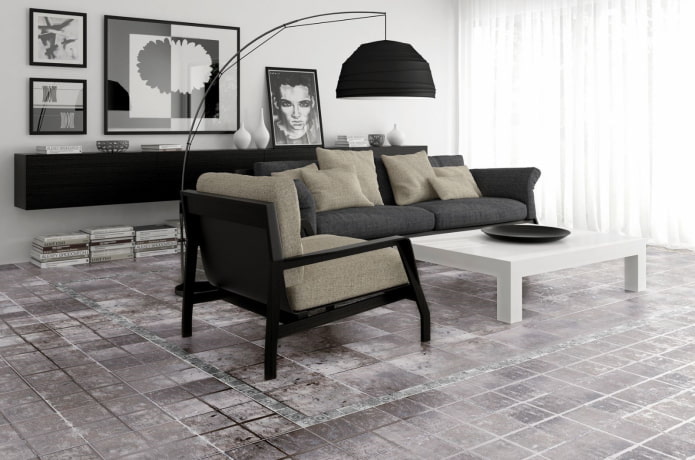
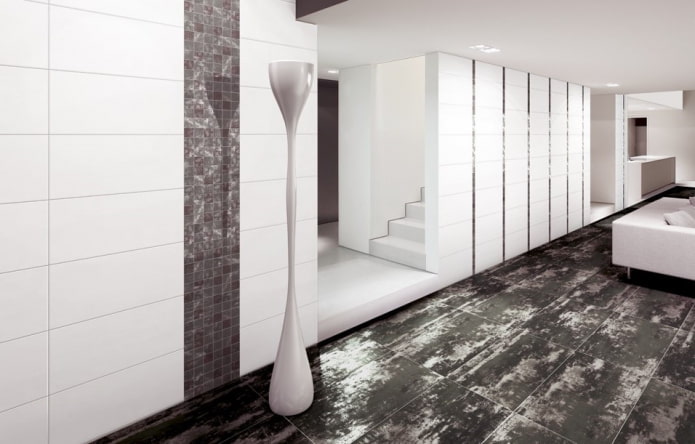
Laminate
Such models are mainly rectangular in shape, which provides the opportunity to get the most similar to laminate, design.
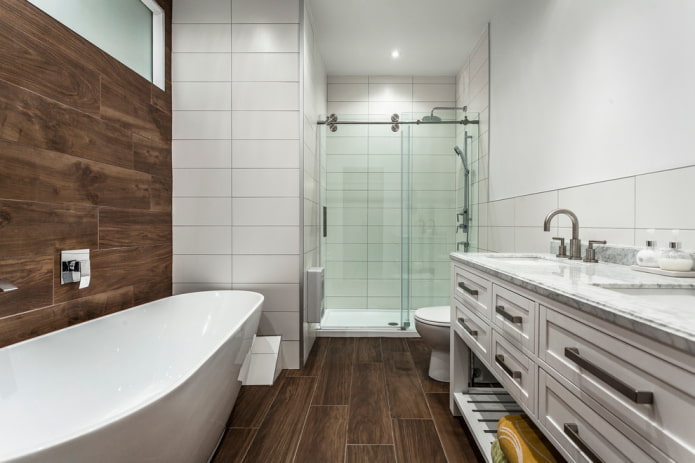
The photo shows the interior of the bathroom with floor tile covering under the laminate of a brown shade.
Tiles with ornaments and patterns
Such finishing material will undoubtedly attract attention and will allow to form an elegant and stylish design, not subject to the influence of fashion.
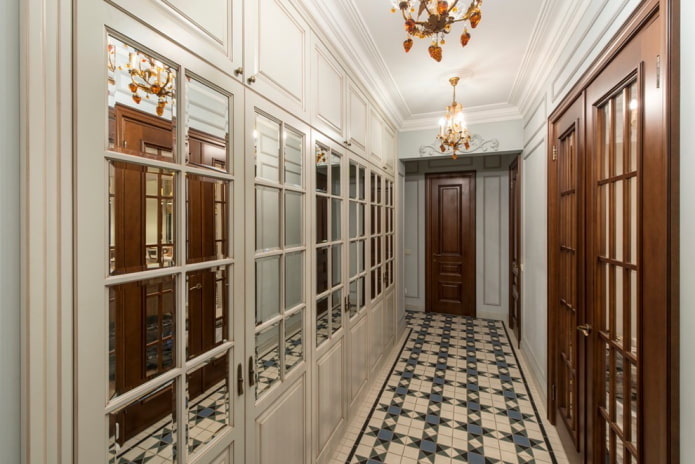
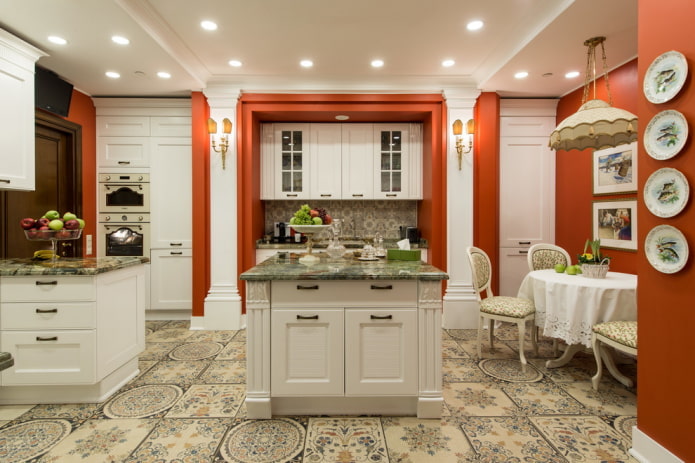
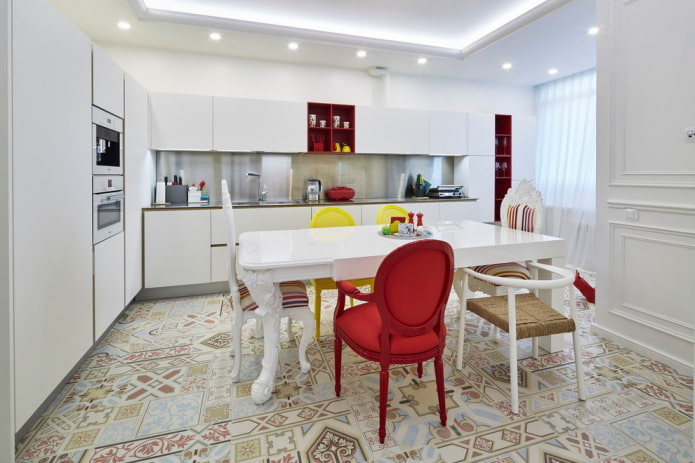
The photo shows a light-colored kitchen decorated with floor tiles with multi-colored patterns.
With decorative inserts
Thanks to a wide range of such tile models, you can bring to life any design experiments and fantasies. The inserts can be decorated with glitter, flower patterns, petals covered with golden glaze and have any other unusual or more discreet decor.
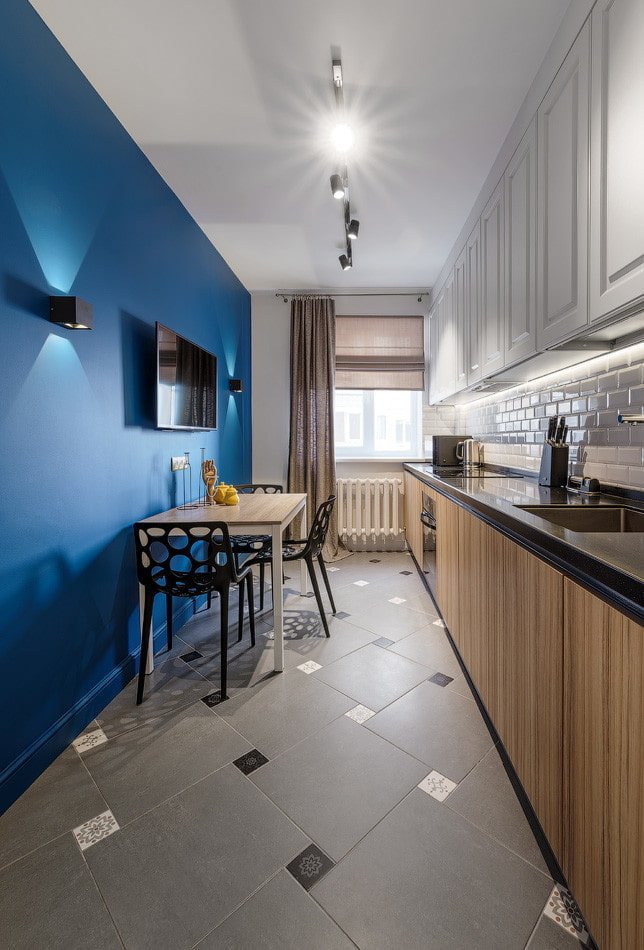
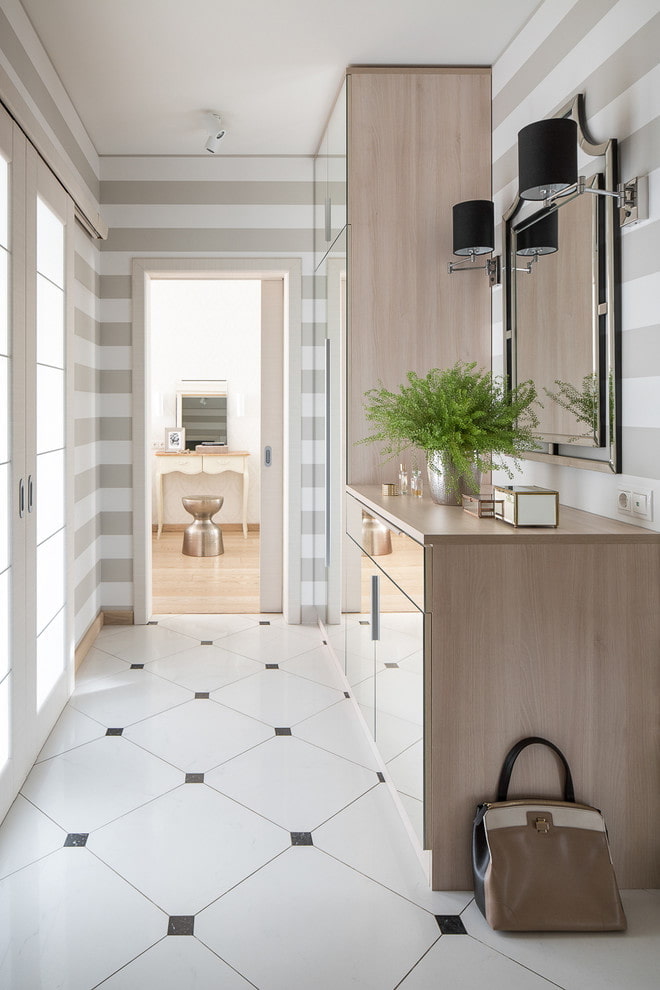
Tile panel
With the help of panels, it is possible to give the environment sophistication and form the main compositional center of the room in the form of an amazing pattern outlined by borders along the perimeter.
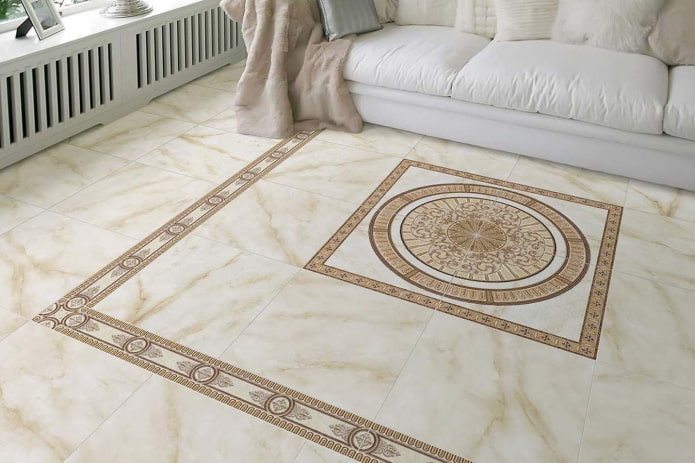
Antique
These vintage models are characterized by scuffs, chips, cracks, texture transitions and muted, as if burnt-out colors, which gives them an amazing resemblance to an aged surface.
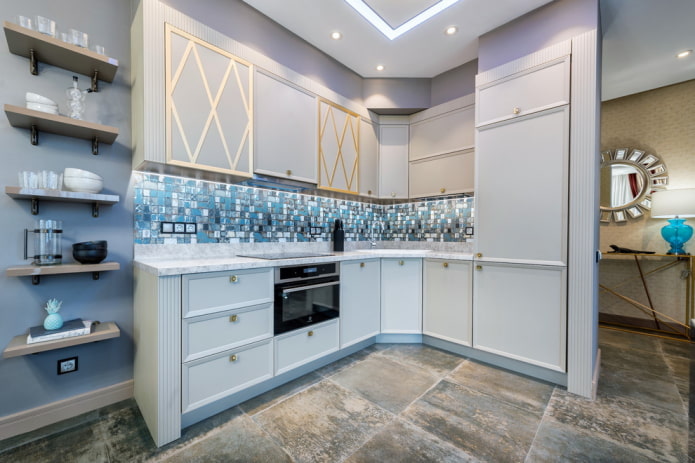
The photo shows square floor tiles, stylized as antique in the kitchen interior.
Geometric patterns
They are distinguished by their special creativity and have a huge number of combinations, shapes and figures. Floor tiles in stripes, checks, diamonds or abstract geometric patterns will add attractive dynamism, motion effect and create optical illusions in the space.
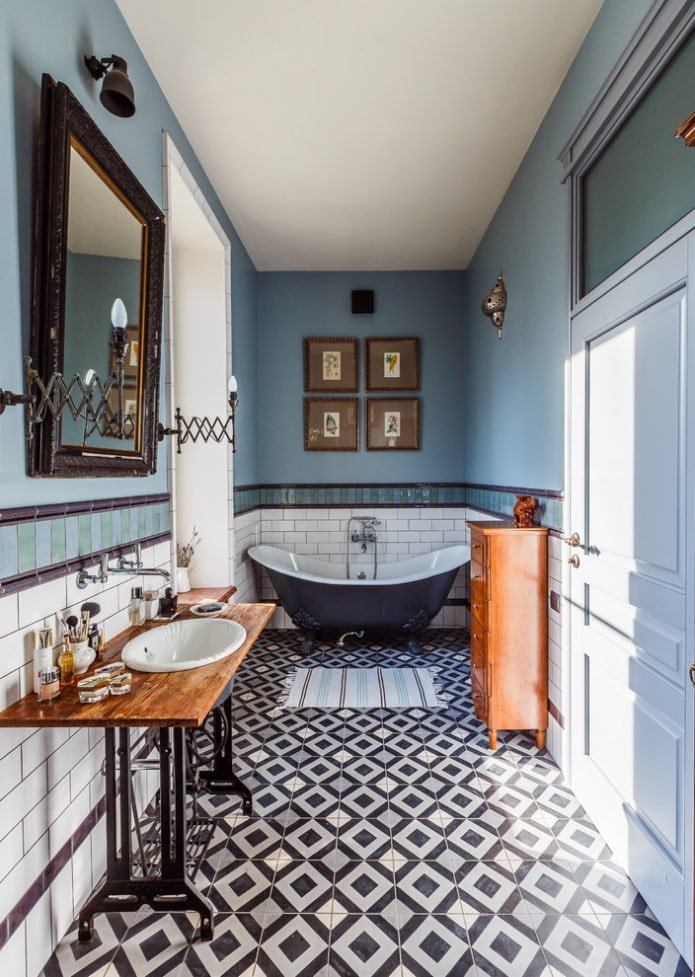
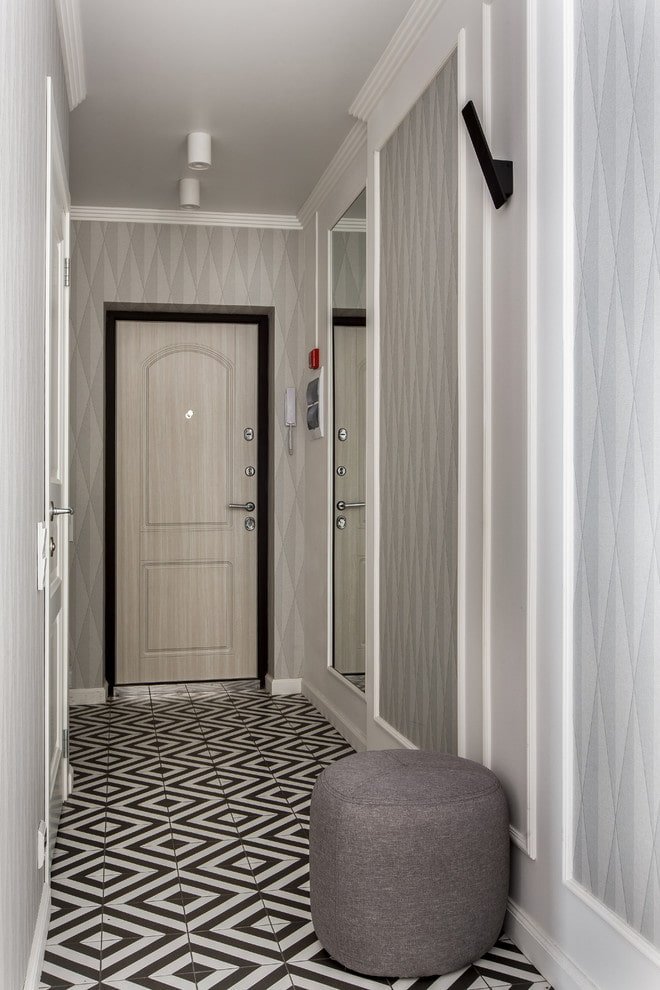
Combination of tiles with other materials
Tiled flooring is especially good when combined with laminate. These materials, correctly selected by color and texture, create interesting zoning of the room, and with the help of rectilinear, curved or semicircular joining, form a more complex and sophisticated design.
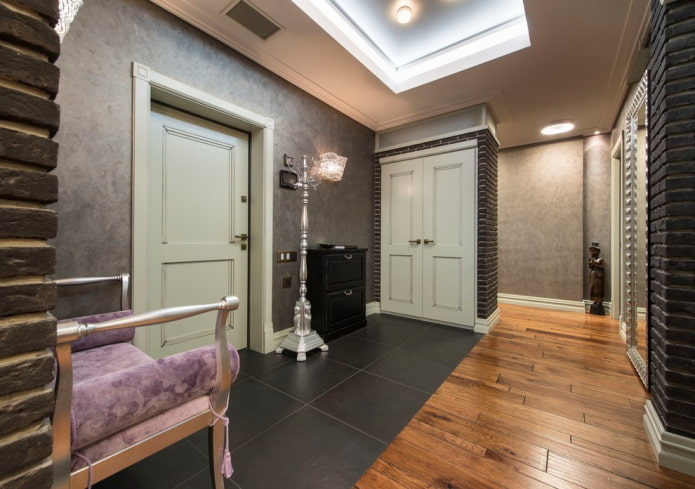
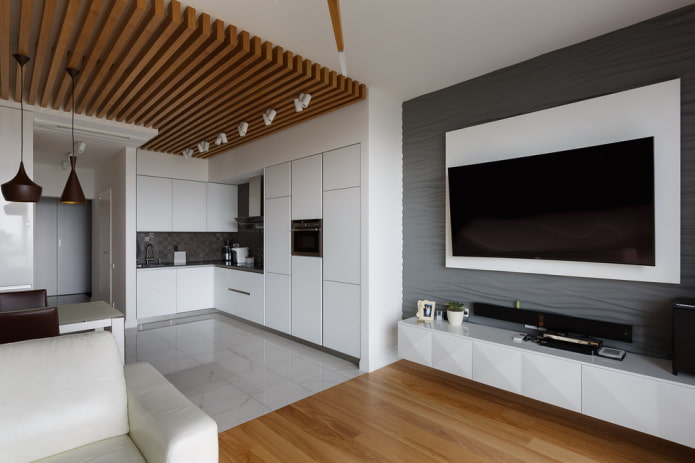
Floor tiles in various styles
Such floor covering can complement any style direction.
Loft
Industrial lofts often use relief products with imitation of brick, stonework, concrete surfaces, or use metallized models with traces of rust and an aging effect.
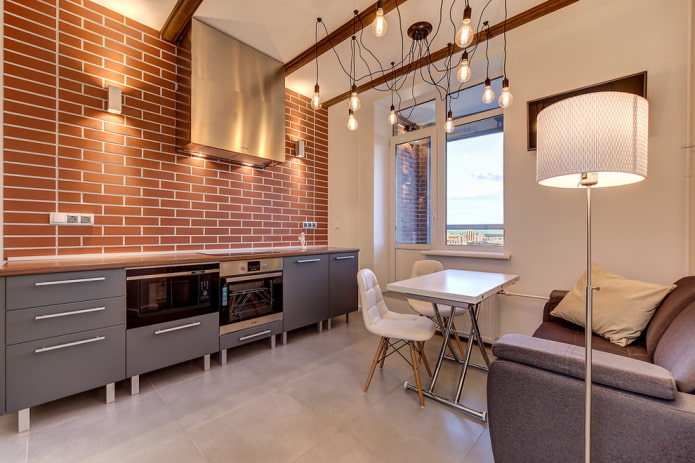
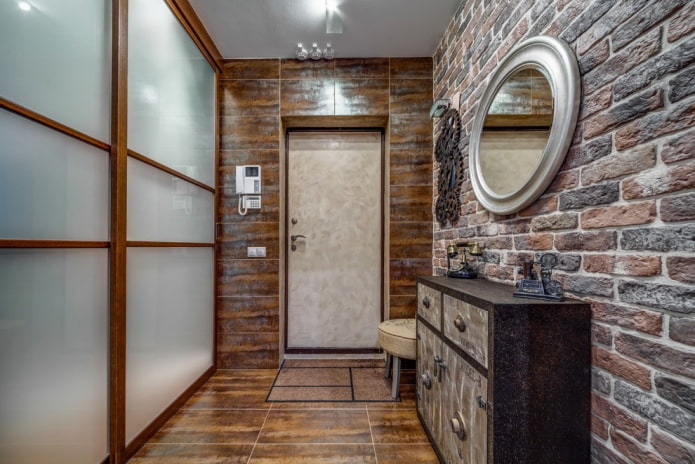
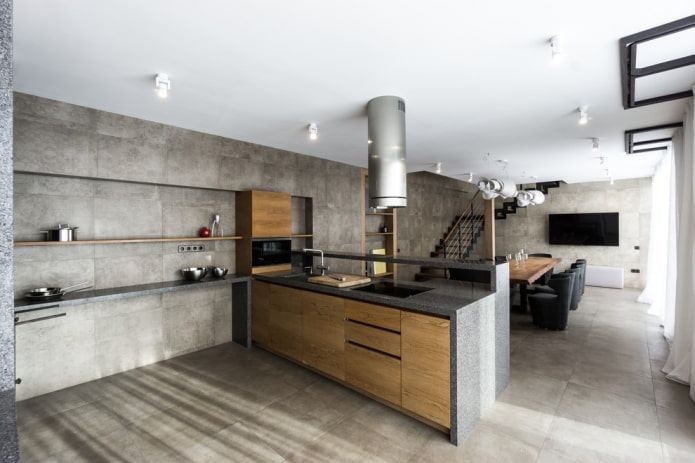
The photo shows the interior of a kitchen-dining room in loft style with floor tiles imitating a concrete surface.
Provence
For a Provence style interior, floor tiles in light pastel shades, textured products imitating natural wood or other natural materials are appropriate. Often, patchwork models with unusual patterns that resemble a carpet are chosen here.
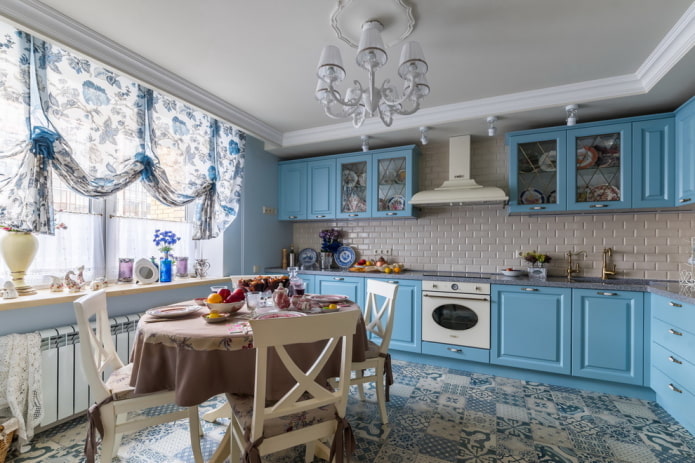
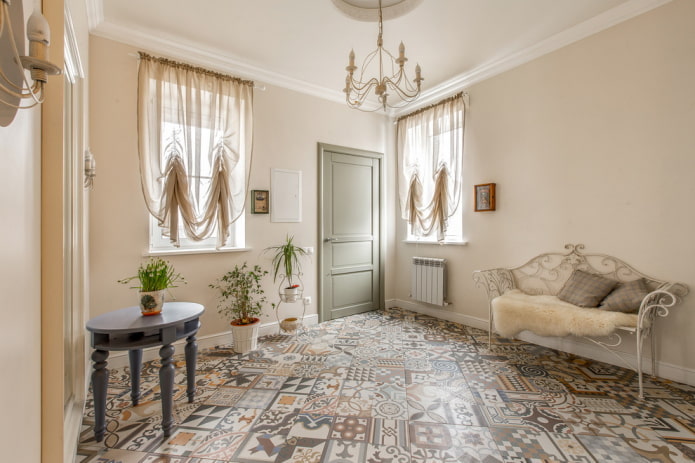
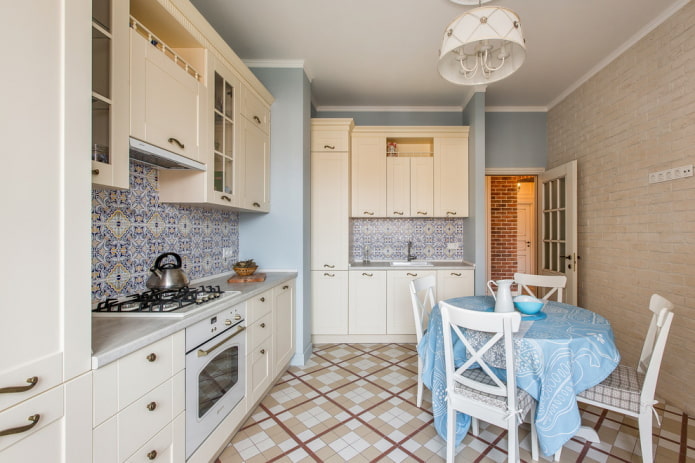
The photo shows a kitchen in the Provence style, decorated with light-colored floor tiles.
English
Clinker finishing or porcelain stoneware are especially typical for the design of English furnishings in an antique style. Here they choose products with original decor and texture or use a solution that is quite popular for this style, in the form of a two-color chessboard layout.
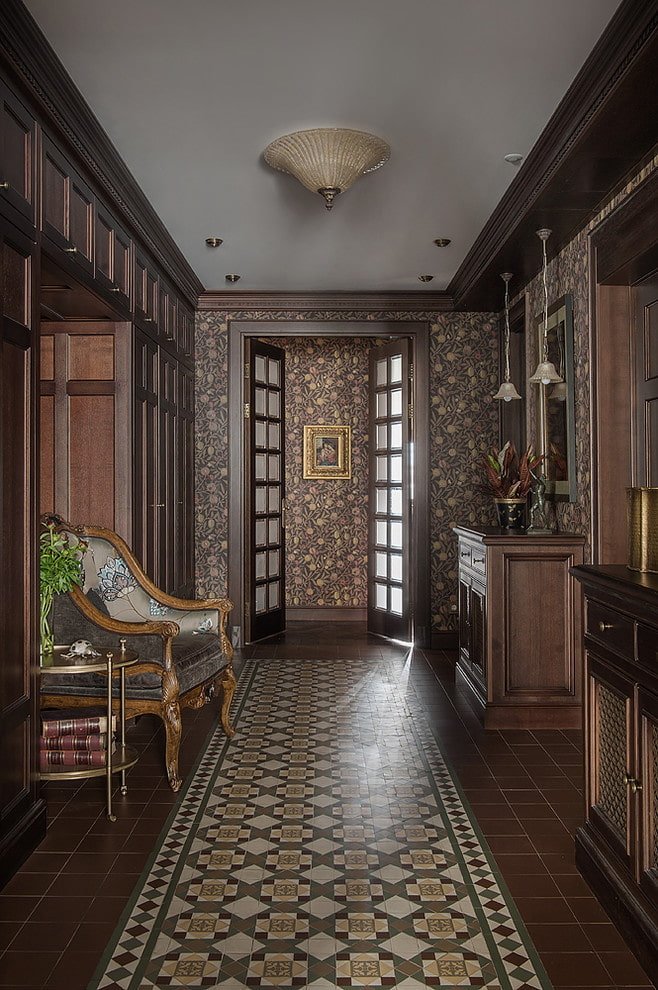
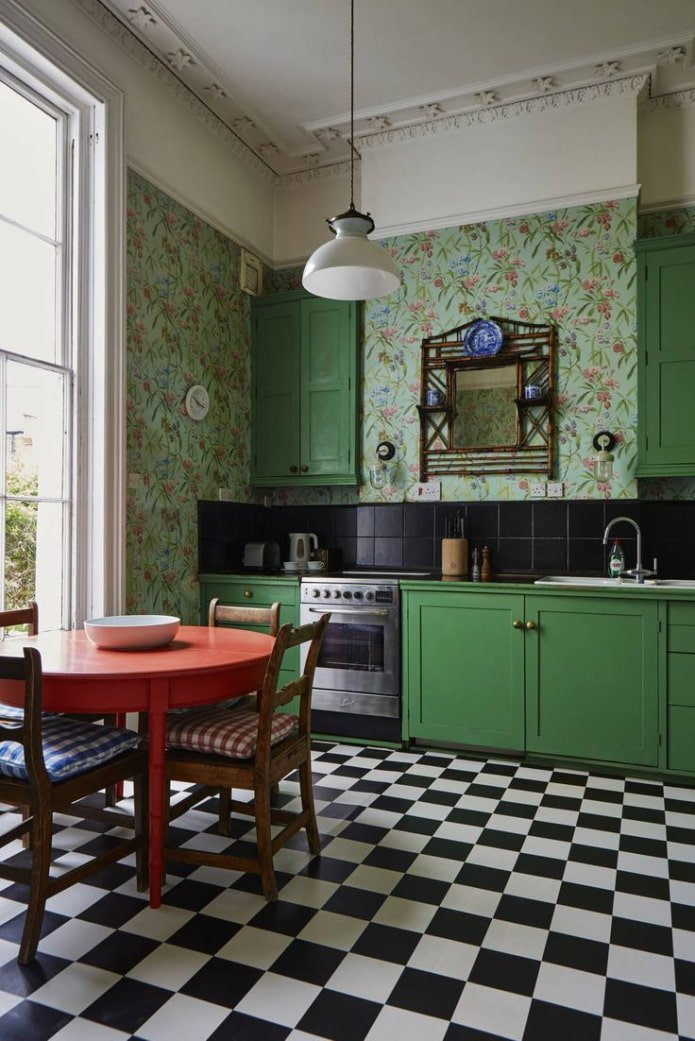
Classic
For the classics, flooring with imitation marble, stone or wooden parquet, finishing with a discreet pattern, for example, is perfect. with monograms or stripes.
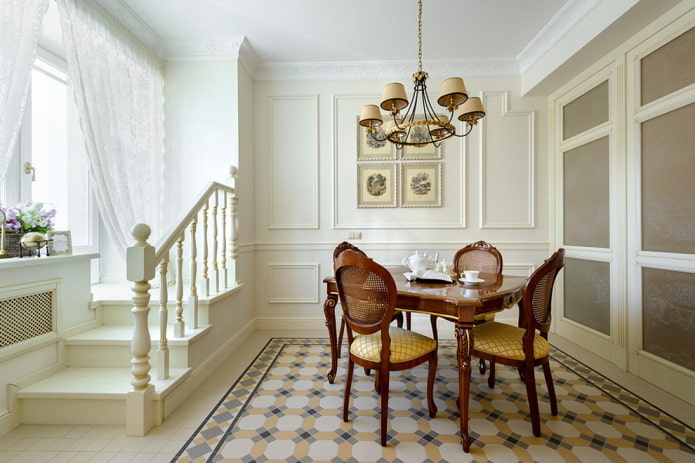
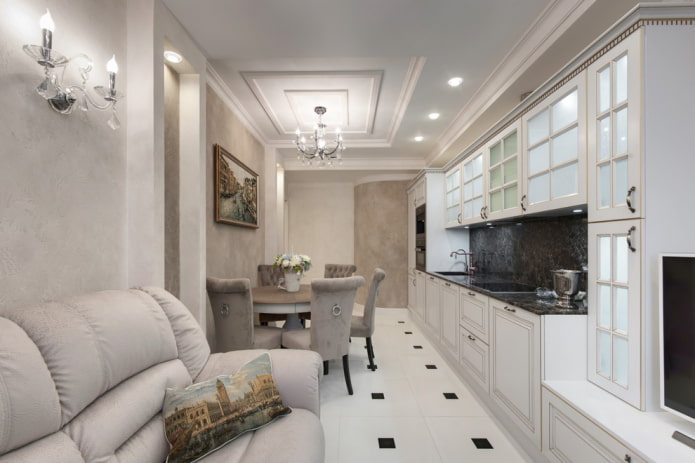
Scandinavian
In the Scandi interior, they prefer light, monochromatic designs or models with geometric patterns and ethnic Nordic motifs. Finishing the floor with wild stone or wood will give the atmosphere a restrained and noble character.
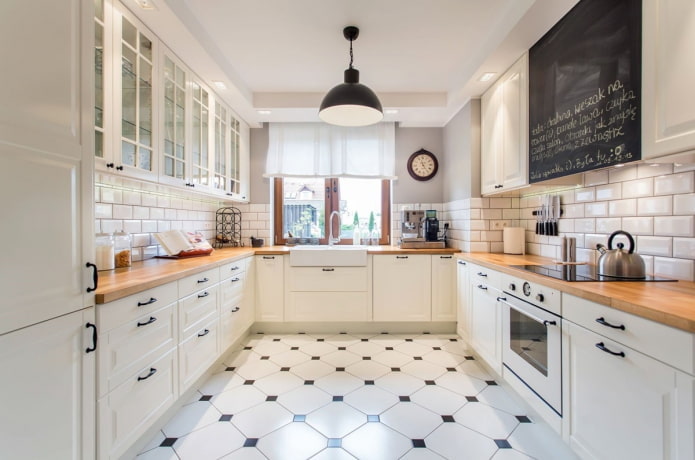
The photo shows white floor tiles with black inserts in the interior of a kitchen in Scandinavian style.
Oriental
This style involves brighter multi-colored ceramics, complemented by decorative inserts, ornamental items with geometric, floral, Moroccan patterns or models with figured cutting. Such decor in eye-catching colors with alternating textures and ornaments will further enliven the space and give it a special mood.
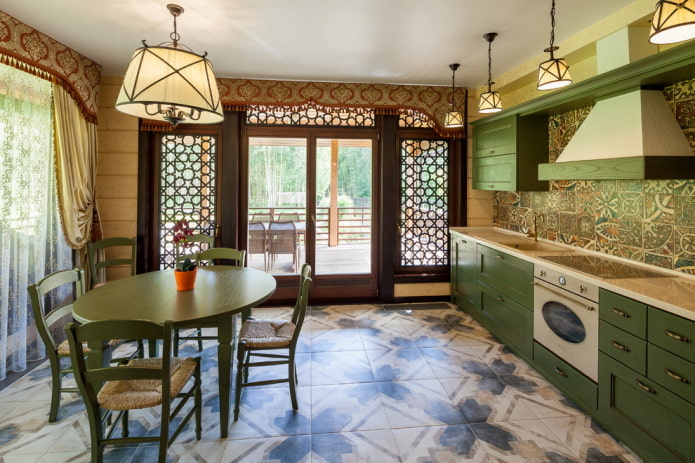
Mediterranean
Here, they often use trim with uneven edges of beige or light brown shades to create the effect of sand underfoot, cladding in the color of a sea wave or products with imitation of boards and stone.
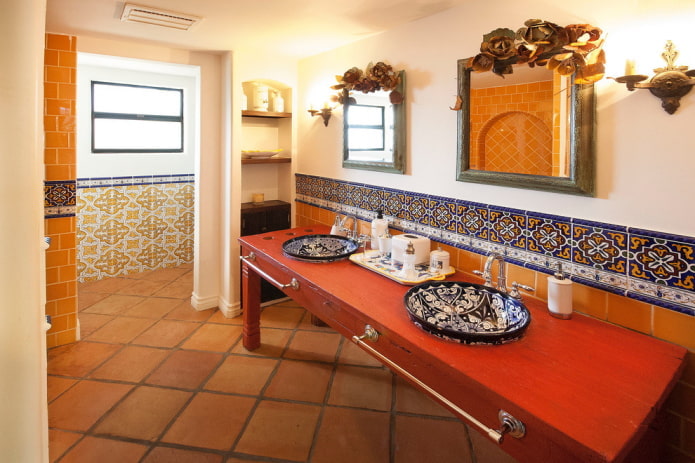
Now reading:
- 15 Ideas for Repurposing Old Newspapers and Magazines: Home Inspiration.
- 13 creative ways to use an old hose at home for good.
- 20 popular varieties of hydrangeas: names and photos of the best species.
- Wrong Ways to Place a TV in a Living Room Interior
- 12 tips for creating coziness in your living room.